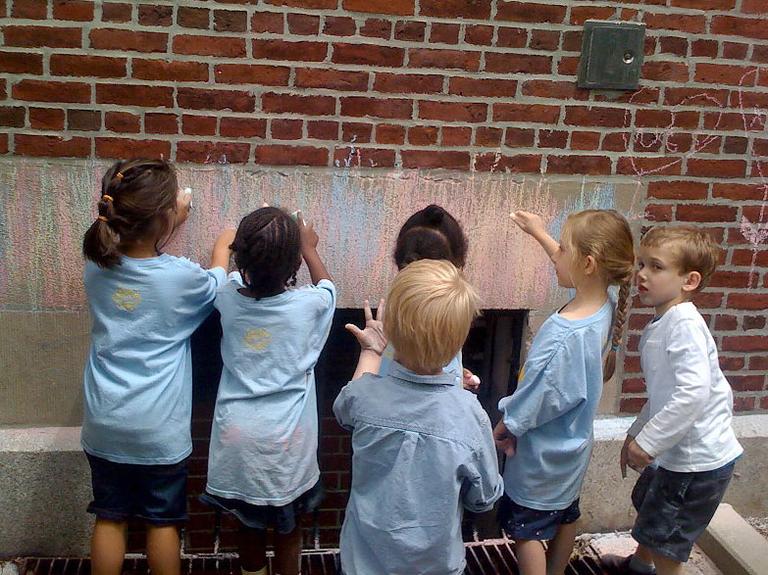Advertisement
'The Year The White Kids Came:' Diversity Grows At JP School

In many ways, Ellis Mendell Elementary is a fairly typical Boston public school. Its test scores are low. The vast majority of students comes from low-income families, and they're Hispanic and African-American.
But there's something unusual about the school's kindergarten class. Meredith McDonough, the kindergarten teacher, knows what it is. She was once a first-grade student in the same classroom.
"I was the one white kid in my class, one of like five in the whole school, five families," she said.
Today, about half of the class is white.
For decades, Boston's public schools have struggled with declining enrollment and resources. Partly, that downturn is because professional parents move to the suburbs and take their kids and resources with them. But in Jamaica Plain — and at Mendell in particular — a growing number of parents is reversing that trend.
Flavia Graf Reardon is among about two dozen parents — most of whom are white professionals — who have flocked to Mendell over the past year or so. There's now a waiting list to get in.
“I personally think what’s going to make the Boston public school system thrive is if the people who live here send their kids here."
Flavia Graf Reardon, Jamaica Plain parent
"Yeah, the year the white kids came," Reardon said. "I want people who live in JP to stay in JP and send their kids to public school. I don't want them to move to Brookline."
Reardon, a teacher, and her husband, a regional planner, live around the corner from the school, near Egleston Square. It's a gritty area on the border of Jamaica Plain and Roxbury where gentrification has only taken halting steps.
The Reardons are into things like diversity and community involvement. And, along with the other new parents, they've invested their time and resources in the school.
"I personally think what's going to make the Boston public school system thrive is if the people who live here send their kids here," Reardon said.
It seems like a simple concept. But for decades white families have left the city rather than send their kids to public schools, a pattern rooted in the busing turmoil of the 1970s.
Advertisement
But there are signs that a new generation of parents — the folks you see pushing strollers in JP, the South End and even South Boston — is taking a second look at the city's public schools.
By all accounts, the catalyst for many of the changes at Mendell was Principal Karen Cahill. Since she came two years ago, the school has gone from under-performing, by state standards, to making adequate progress.
Cahill exudes school spirit, like a middle-aged cheerleader. Parents from the neighborhood heard about the changes she was making and came to visit.
"I think the first thing that parents want to know is their child is gonna be safe," Cahill said. "And the school itself is beautiful. I invite them over. I have an open door policy. You don't have to make an appointment. 'Come on in, we're hiding nothing. You're more than welcome to see everything.' "
If Cahill got the ball rolling at Mendell, the new parents have run with it.
For the first time in as long as anyone can remember, there's now a parents committee at the school. They've started a music program, a karate class, an "outdoor classroom" is being built and the school is seeking a grant for a sports program.
But there's no escaping the fact that the parents committee is dominated by the white newcomers.
"I personally have felt very aware, and it's a difficult dance not to feel like this load of white parents came and steamrolled this school and took it on," Reardon said.
Reardon says the committee has been working on ways to get other local parents more involved.
Horace Small, for one, doesn't think the new parents are out to take over the school. He's an African-American activist and the executive director of the Union of Minority Neighborhoods.
"The idea we have white parents in JP who are serious about making sure their children experience the richness, the vastness, the diversity — not only in their community but in the city of Boston — I think is a very, very good thing," Small said.
Boston school officials also like what they're seeing. They want schools to more closely reflect local demographics, and Mendell isn't the only school in the area where this is happening. At Roslindale's Haley Elementary, white students now make up 22 percent of the school, up from 2 percent in 2004.
Denise Snyder, Boston Public School's director of Welcome Services, says there's a link between diversity, school performance and — most importantly — parental engagement.
"To be candid, in every school there's a certain amount of roll-up-your-sleeves-ness that's required," Snyder said. "And families who have the time in their schedule, the inclination towards supporting education and the resources in terms of financially being able to support schools, the better off we are."
Next year, the parents at Mendell will be rolling up their sleeves more than ever. Despite their objections, the district decided to transfer Principal Cahill to another school.
The good news: the parents committee got to choose her replacement.
This program aired on July 19, 2010.